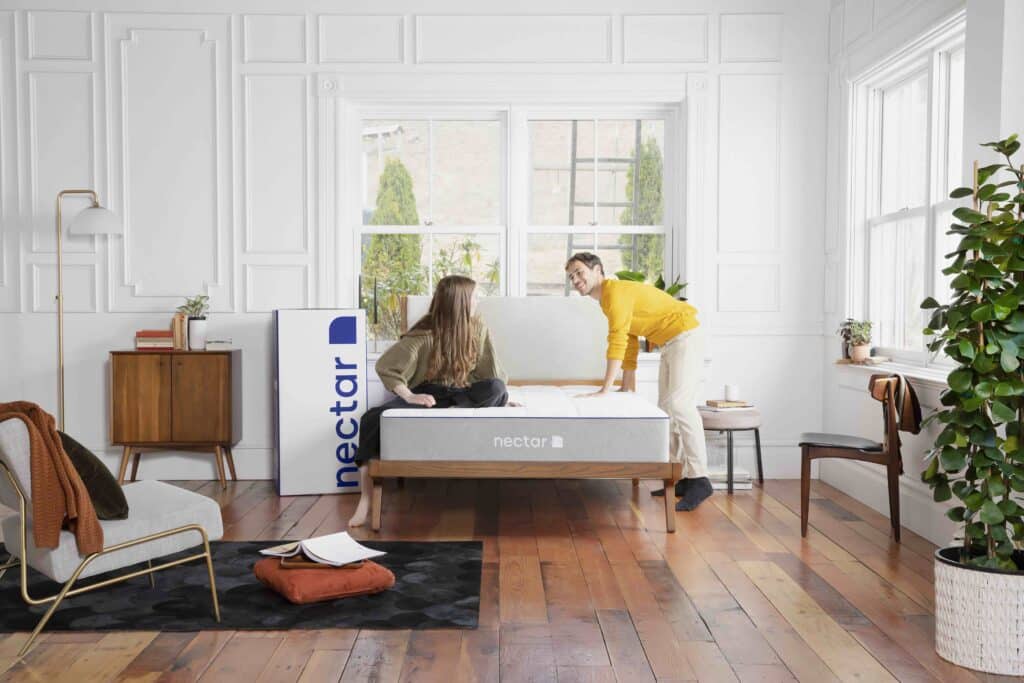With staggering sales, one marketplace that has literally boomed during covid is the ‘bed-in-a-box’ mattress concept. As business owners it’s important to understand the strategies they’ve employed to begin, capitalise and maintain epic rates of growth.
I’ve spoken to some of the top providers in the marketplace to understand how they’ve managed to adapt and conquer despite rigorous changes to their systems to ensure their business model could survive the sheer rise in mattress demand spurred on by the virus. Ready to take notes?
So how did lockdown effect the data and trends of buying mattresses?
Simba Sleep found that data from their consumer sleep app, used nightly by 50,000 people in the UK alone revealed that people were wrestling with their sleep in lockdown. This level of stress could be one of the reasons for the upturn in sales. People have been searching for self-care solutions at a time when anxiety around COVID-19 is causing a plethora of sleep issues. They also noted a rise in single mattresses being sold, suggesting that people were buying mattresses to isolate in separate rooms if need be.
Price point data showed that whist some people were still furloughed, they were still spending however they were being more cautious with their cashflow. Whether it was preparing attic rooms for isolation or a general refresh in the home, Steve Reid co-founder and CEO of Simba said:
‘In the weeks leading up to lockdown we experienced a slight dip in sales, as the UK watched and waited. However, as soon as lockdown was announced, sales online surged in a way we haven’t seen previously.’
Further explaining the state of the rise in sales, Michal Szlas, CEO of Otty said:
‘Previously, the mattress market was heavily reliant on the property market as many consider and purchase a mattress when moving house. This sector came to a sudden halt during covid which could have posed a serious threat to our industry. However, the direct-to-consumer businesses found that those in job secure industries have had more cash in their pocket due to restrictions in entertainment spending.
‘This has been diverted into ’nesting’ activities around home improvements. With the time to upgrade or refresh their mattress as part of their home improvement, sales have soared.’
Every mattress provider had to battle with supply chain issues. Not just simply getting the product but having enough vans on the roads to deliver them within a lockdown.
Speaking candidly about Nectar Sleep’s covid battle, Managing Director UK, Angela Crouch said:
‘We generally forecast up to six months in advance of what we think we’re going to do, and literally at the end of March our business skyrocketed overnight when retail shut down. It was incredibly challenging because we were dealing with this pandemic and what it meant for our staff and our families, but on the flip side, business was booming. We used everything at our disposal to ensure deliveries could still take place. With all the forecasting in the world we couldn’t have predicted this.
‘We’re fortunate to have very good UK manufacturers and yet we were on a knife edge expecting the call from them saying that they weren’t producing mattresses any more and we might have to close down the business. It was crazy, we prepare all year for Black Friday and here we were in April, in Black Friday.’
Pure honesty with their consumers helped the mattress contenders to remain in the fight for survival
All of the brands offer assurances of service, be it delivery or an extra service such as taking away an old mattress to make room for the new one. Covid provided a need for quick thinking once again as consumer’s patience levels were tested. When asked whether on the whole customers were understanding, Angela replied:
‘For the most part, our customers were very supportive of the fact that we had to battle a few delays. Which I think they could realise that we were just as disappointed as they were, when not being able to assure delivery times etc.
‘We moved to contactless delivery which solved the issue of as being able to provide the product to the customer, but mattress removal was something that we couldn’t offer. We donate our returns to the British Heart Foundation because we don’t want our mattresses to go to landfill. The charity sells them through their stores, which of course were shut during lockdown. We had to just say: ‘can you hang on a little bit. We don’t know how long it’s going to be’. And for the most part customers were fine. If it really needed to be moved we offered a new recycling service through a third party which carried an extra fee but got the job done. My team moved heaven and earth to get everything done, we’re now preparing for the Black Friday rush …’
It’s not all about the mattress, every team member needs to be comfortable during the day too …
Nectar Sleep’s team is really small in the UK. Twelve people head it up and that includes the customer service element too. Onboarding new team members, sourced through third parties amidst the lockdown was no mean feat. However, hiring a coach to show the entire team how to function from home, ensuring that every team member was communicated to on a regular basis and sorting out everyone’s home work areas made everything flow. As Angela said: ‘A lot of the team are younger and living in shared accommodation with limited ‘office’ use space. One of my team confessed that they were working on an ironing board because the desks had sold out in the panic buying session. Rectifying these problems was our absolute priority.’
Thinking of entering a marketplace that is already heavily dominated? Otty heralds the importance of competitor analysis and USP’s
Head of marketing at Otty said:
‘The trend in this sector was to revolutionise the way we purchase mattresses so everyone does the 100 night trial however we felt that some of the products being delivered were a little style over substance in their make up. Many of our competitors either have no springs or very few and without them these mattresses have a tendency to retain the heat. Our product is totally different so we stand out.
‘Naturally being a bit of a David amongst the Goliath’s has been a challenge without the aid of multi-million pound investments to find significant marketing spend but with careful marketing placement we’ve been able to compete and having arguably the best product at the keenest price point in the boxed mattress market.
We have held our own where larger competitors have fallen away with the likes of Casper and Leesa leaving the European challenge. It is a tough market but we are competitive with our competition.’
What else is needed to boost ecommerce trade? Trust and reassurance – especially when buying an online mattress
Let’s face it, traditional mattress shopping would involve driving to one of the giant bed stores lying circa twenty mattresses and buying the one that felt most comfortable to you.
As much as people have heard how comfortable memory foam mattresses are, the D2C industry still faced the dilemma of competing with a face to face sales person in a trustworthy and friendly environment.
All of the major bed in a box providers decided to do one thing: offer extended mattress return policies. Simba extended their 100 day trial period up to 200 during lockdown, Otty offer 100 day return, Emma state 200 days and Nectar comes in at the top with a whopping 365 one year trial period.
Whilst subject to different terms, some even a visual inspection, this has acted as a powerful message in two crucial ways:
- Firstly it showed belief in their product offering and belief that people would find them to be comfortable.
- Secondly the fear surrounding a lack of human contact and testing needed to be levelled. To spend between £200 and £1200 online without trying it first is a risk – offering this timescale helps to build trust and mitigate the risk of a purchase.
All that said, how have they managed not only to survive but to capitalise on buying trends during covid and beyond?
You can only be agile in business if you’re constantly looking at the trends and adapting to suit them. Quick to adapt both product and price points was one of the first changes made by Santosh Marrivagu, Head of Emma, UK and Ireland. He said:
‘Our goal is to maintain our dynamic growth while ensuring that all workflows and capacities are extended accordingly,’ explained Marrivagu.
Increasing specific areas to offer consumers more choice on their main product range, the team at Emma added a new ‘essential’ mattress alongside their higher pricing range to target a different spending category of consumer. They managed to extend their range and their audience by cutting products that weren’t making enough of a return.
‘Both the new pricing structure and the new product range are intended to attract different target groups. “As a direct-to-consumer brand, we get direct feedback from our customers and can quickly adapt to their needs and shopping habits’, said Marrivagu.
Marketing efforts and an existing partnership with John Lewis had placed them in a positive brand alignment, so when covid hit, they worked quickly to sort out the logistics while channeling an agile mindset to find opportunities amidst the chaos. Emma welcomed their millionth sale mid covid, smashing their year on year results in both April and May and achieving their 2020 target way ahead of schedule. Listening to customer feedback and consumer trends clearly paid off.
Channelling innovation when testing the mattress marketplace
Nectar Sleep attained their business model from their partners in America and brought it to be manufactured in the UK. Whilst the pitfalls and experimentation of certain aspects had already been tried and tested over in the US, their model for releasing newly devised products to their range over here now falls onto Managing Director Angela Crouch. Her strategy is to create a minimum viable product, put it out to their audience and if their target market loves it, then they push forwards with larger orders. Ensuring that no money is ever wasted.
Speaking to each of these core providers in this space has been incredibly interesting. It’s clearly a dynamic marketplace that is showing no signs of slowing down.
Takeaway segment from the bed-in-a-box industry for you to apply in your own business:
Be intentional – Each of the brands are incredibly intentional. They’ve chosen every single aspect of their company. Nothing is there by chance or because ‘we’ve always done it that way’. They choose and continue to evaluate and make new choices every day, week, month.
Be agile – Ask for feedback and innovate to respond to it with new ideas – this comes from your team and your customers
Work hard – Covid provided a rush which was amazing, but with it it brought numerous logistical and staffing challenges all of which required
State your purpose – Be clear with your purpose – who you are and what you do. What problem are you trying to make better for your customers?
Have clear, friendly branding – Each of these successful brands has perfectly clear branding at every consumer touchpoint. You don’t have to read through piles of content to find out what you want to know. If you’re not in a rush then you can read up and geek out further. Both options are there for you.
Show confidence – Testimonial and customer feedback are open and on each site along with awards, statistics or achievement milestones.







